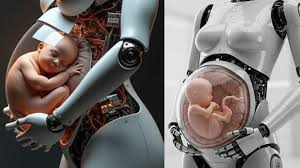
Breaking News
 Horror Israeli Intel Database Reveals 83% Killed In Gaza Are Civilians!
Horror Israeli Intel Database Reveals 83% Killed In Gaza Are Civilians!
 Aaron Lewis on Being Blacklisted from Radio & Why Record Labels Intentionally Promote Terrible Music
Aaron Lewis on Being Blacklisted from Radio & Why Record Labels Intentionally Promote Terrible Music
 The Number of Housing Units Under Construction Continues to Crash
The Number of Housing Units Under Construction Continues to Crash
 U.S. Federal Reserve's New Supervision Chief Sold on Bringing Crypto to Finance
U.S. Federal Reserve's New Supervision Chief Sold on Bringing Crypto to Finance
Top Tech News
 Video Games At 30,000 Feet? Starlink's Airline Rollout Is Making It Reality
Video Games At 30,000 Feet? Starlink's Airline Rollout Is Making It Reality
 Automating Pregnancy through Robot Surrogates
Automating Pregnancy through Robot Surrogates
 SpaceX launches Space Force's X-37B space plane on 8th mystery mission (video)
SpaceX launches Space Force's X-37B space plane on 8th mystery mission (video)
 This New Bionic Knee Is Changing the Game for Lower Leg Amputees
This New Bionic Knee Is Changing the Game for Lower Leg Amputees
 Grok 4 Vending Machine Win, Stealth Grok 4 coding Leading to Possible AGI with Grok 5
Grok 4 Vending Machine Win, Stealth Grok 4 coding Leading to Possible AGI with Grok 5
 Venus Aerospace Hypersonic Engine Breakthroughs
Venus Aerospace Hypersonic Engine Breakthroughs
 Chinese Scientists Produce 'Impossible' Steel to Line Nuclear Fusion Reactors in Major Break
Chinese Scientists Produce 'Impossible' Steel to Line Nuclear Fusion Reactors in Major Break
 1,000 miles: EV range world record demolished ... by a pickup truck
1,000 miles: EV range world record demolished ... by a pickup truck
 Fermented Stevia Extract Kills Pancreatic Cancer Cells In Lab Tests
Fermented Stevia Extract Kills Pancreatic Cancer Cells In Lab Tests
Automating Pregnancy through Robot Surrogates

Kaiwa Technology in Guangzhou plans to release these robots in 2026 for $1,400, or a small fraction of what couples pay for surrogates. Has science gone to far in the quest to play God?
These "pregnancy robots" are vastly different from traditional incubators that are utilized for premature or at-risk newborns. The fetus develops within the robot's artificial womb in synthetic amniotic fluid. Scientists have developed artificial placentas equipped with a tube system operated by AI, which can feed the baby oxygen and nutrients during gestation. Humans have never procreated through an artificial womb nor has a robot replicated the whole gestation process.
Surrogacy was deemed unethical, and the Chinese government banned the practice in 2001. The government prohibited the trade of ova, sperm, embryos, and other related reproductive items. If not outright banned, most nations have a complicated legal framework surrounding surrogacy and parental rights. The Chinese government believes gestational surrogacy exploits women in poverty, and the law recognizes the birthing mother as the legal mother. Still, repealing the one-child policy and infertility have caused a spike in interest.
Some believe this technology will be a breakthrough for couples suffering from infertility. Outside China, same-sex couples could also benefit from AI-driven surrogacy that costs a fraction of the price. Women may not be exploited for their wombs, but what about the babies born to non-human figures?
The mother-child relationship is the genesis of life and creation. The age-old debate of nature v nurture always concludes that both are essential. Scientists conducted a number of unethical studies during the last World War to see what would happen if a baby were deprived of nurture. Naturally, these studies could never be replicated again.
The Third Reich was keenly interested in eugenics and expanding the Aryan race. In 1935, Heinrich Himmler implemented selective breeding programs for "racially pure" women. Lebensborn homes were developed to discreetly provide unwed women the opportunity to procreate. The Christian society villainized unwed mothers, and so the program operated in secrecy. After birth, biological parents were forced to surrender all parental rights to the German government who assumed full parental guardianship. Thousands of children were born under this program that lasted nine years and expanded to all Nazi-occupied territories.

 3D printing set to slash nuclear plant build times & costs
3D printing set to slash nuclear plant build times & costs

